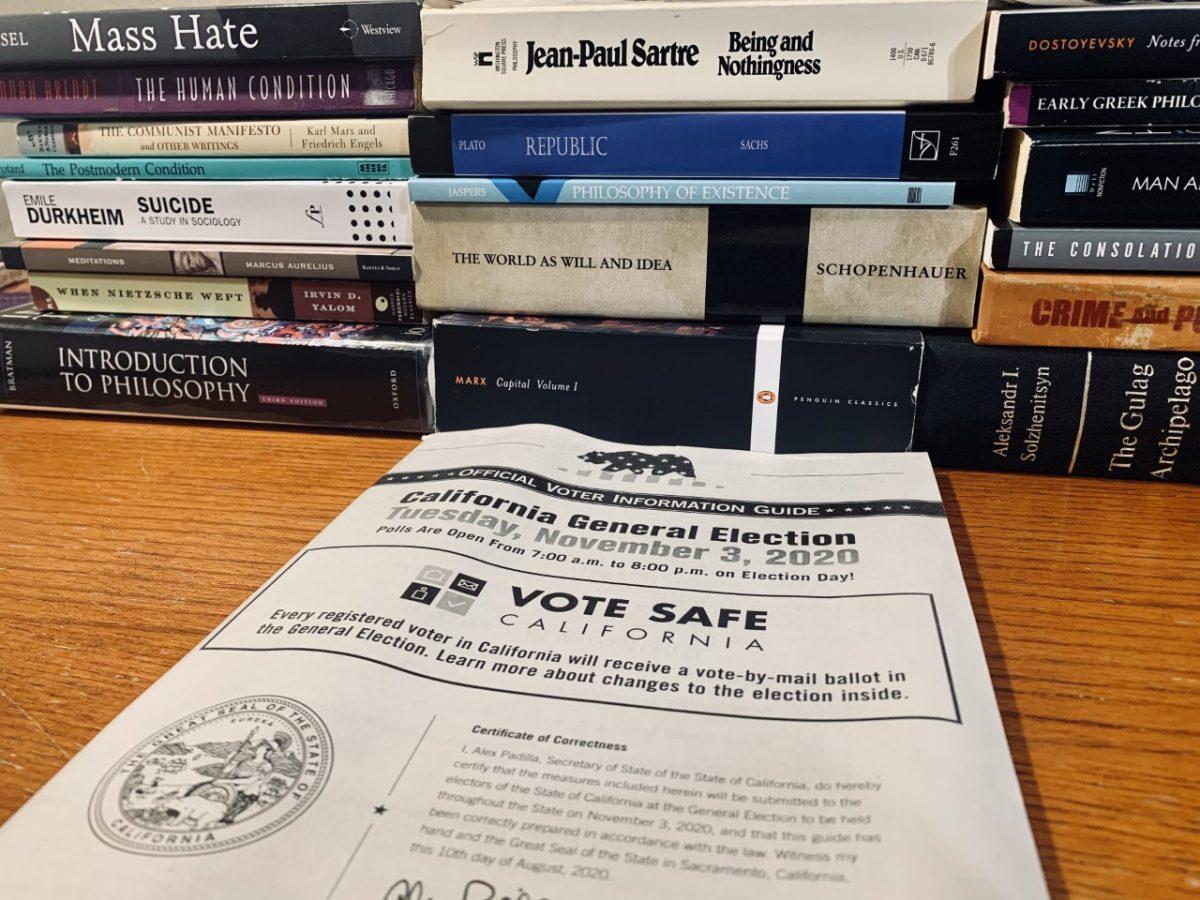Politics is often riddled with generalities, euphemisms, manipulation, pernicious self-interests, and egregious intentions. A study of philosophy can help develop our critical capacities, enabling us more capable of detecting these threats. This is an indispensable tool for deciding who to vote for in the upcoming presidential election.
The “Most Important Election” in United States History
The 59th United States presidential election is days away, an election characterized by many as being the “most important election” in United States history. This election is situated within a political climate experiencing unsettling levels of political hostility. Symptomatic of the hostile political atmosphere, political hostility through individual, mass, and state acts of violence have been frequent headlines in major news organizations. As if this was not enough, we are also in the midst of an ongoing pandemic that has killed more than 230 thousand in the United States alone, which has edged the nation closer to economic collapse.
On November 3rd, either presidential challenger Joe Biden or incumbent Donald Trump will be given an immense amount of influence on these severely consequential matters. Both candidates have analyzed the various ailments that plague the United States, both have derived their own conclusions, and now both want to convince you that their approach is worth your vote. Well how are you going to determine the validity, sincerity, and purpose of their conclusions and proposals? Philosophy can help.
How Can Philosophy Help Us Vote?
Philosophy, broadly defined, is the attempt to clarify and understand truths about ourselves and the world we live in. This is done through constant criticism, clarification, and argumentation. Philosophy consists of various fields, each with their own intricate complexities, but for the purpose of helping us vote, I will only be mentioning a few recommended philosophical works after explaining the beneficial effects of studying philosophy, namely, its development of our critical faculties.
In order to elucidate what philosophy has to offer, CSU Stanislaus professors and students shared their thoughts on how philosophy has aided their electoral deliberations.
Dr. Valerie Broin, philosophy professor at CSU Stanislaus, described the study of philosophy as a tool to help us “assess and understand what politicians are saying,” which in turn allows us to recognize the manipulative rhetoric stemming from politicians aiming to take advantage of our ignorance.
Not only does philosophy help us recognize the manipulative rhetoric of some, but it also allows us to recognize political arguments that are well-reasoned and also those that are insufficient. It is the nature of philosophy itself that helps us do these things. As Dr. Broin stated, “so much of philosophy encourages us to question even those who are set up as authorities, not just dismiss them, but to examine what could be important and what could be problematic.”
An Analysis and Checklist for Fascist Candidates
One of the recommended philosophical works was 20th century French philosopher George Bataille’s essay on The Psychological Structure of Fascism. This work was recommended by Dr. Jason Winfree, professor of philosophy at CSU Stanislaus, who described the essay as an examination on the relevant “dangers of organizing political life according to resentment directed towards scapegoating and the glorification of violence.”
In his essay, Bataille examines the general structure of a society and the emergence of authoritarian leaders characterized as being “above men, parties, and even laws: [forces] that disrupt the regular course of things.” These authoritarian figures take advantage of disaffection within a society, using it as justification for their emergence to power, and position themselves as all-encompassing solutions, even through violent means.
As Dr. Winfree stated, Bataille’s essay helps explain “the cult-like religious status of certain authoritarian rulers.” The current widespread discontent that stem from the effects of the COVID-19 pandemic and the record levels of political polarization can provide sufficient grounds for the emergence of authoritarian leaders. Bataille’s essay helps us recognize the features of fascism and its destructive consequences, it would be wise to ensure that the candidate we vote for does not share this quality.
Not All Lies Are Equal
President Donald Trump has frequently been criticized as a liar, but so has candidate Joe Biden. If both candidates are known to lie – something manifestly true – is there any significant difference between the lies of Biden and Trump? A common assertion is that lying is a staple of all politicians. All politicians lie, so why waste time asserting that being caught in a lie should be reason to degrade a candidate’s electability?
CSU Stanislaus philosophy professor Dr. James A. Tuedio’s recommended the book On Bullshit by American philosopher Harry G. Frankfurt, saying that it provides a distinction that can help answer this question. In his review of Frankfurt’s book, Dr. Tuedio describes Frankfurt’s work as a relevant analysis of the “bullshit and disdain for the role of fact and a prevalent indifference to truth” that characterizes the state of U.S. political discourse.
Frankfurt’s On Bullshit analyzes the difference between lies and “bullshit,” distinguishing the latter as far more destructive. According to Frankfurt, “bullshit” is distinct from lying because, not only does it masquerade a falsity as truth, but it also completely disregards any concern for truth. Bullshit isn’t concerned with whether or not something is manifestly true or false, all that matters are self-interested purposes. Not only does this erode public trust, but it also fosters indifference towards any form of lying. It is evidently clear that both candidates lie, but which one seems to consistently engage in “bullshit?”
The Consequences of Lying
In keeping with the theme of lying and manipulation, CSU Stanislaus student Samantha Thomas (senior, Political Science major, Philosophy minor) recommended Lying in Politics by political philosopher Hannah Arendt. Arendt’s Lying in Politics is preceded by the release of the Pentagon Papers, a classified study conducted by the Department of Defense during the Vietnam war that revealed stark inaccuracies between the official governmental reports given to the U.S. public and the realities of a failing, calamitous war effort.
According to Thomas, Arendt’s essay helps us understand that, when “politicians [are] making misleading or incorrect statements to the public, they are contributing to this phenomenon of lying that separates the public’s perception of reality. They are contributing to not only vast polarization in ideology, but significant disagreement in interpretation of facts.”
In her essay, Arendt points to the sense of thoughtlessness that makes it extremely difficult to maintain a society’s commitment to truth, a difficulty that’s marked by a tendency to fall prey to manipulation. One of her salient conclusions is that “lies are often much more plausible, more appealing to reason than reality, since the liar has the great advantage of knowing beforehand what the audience wishes or expects to hear.” The amalgamation of thoughtlessness, fallible memory, manipulability, and self-deception that led to the destructive lies concerning the United States’ role in Vietnam remains a prevalent feature of contemporary politics.
Stoic Considerations for The Upcoming Election
The election will pass and regardless of who’s elected, it’s important to be cognizant of a point made by CSU Stanislaus student Nick Libby (senior, Philosophy), who says that aside from being politically engaged citizens responding to consequential political issues, we should also “focus on our thoughts, feelings, and reactions to these things.” This is why Libby recommended stoic philosopher Epictetus’ The Handbook.
Stoic philosophy is broad with various stoic philosophers positing distinct philosophical conceptions, but a general aim of stoic philosophy is its emphasis on the regulation of our reactions to things outside of our control. This is not to say that we have no say in who gets elected, far from it. However, in the instances in which we do not have control over external occurrences, we can benefit from stoic practices that philosophers like Epictetus employed. As Libby says, some things “are not in our control and obsessing over these external things is bad for our mental health.” This election might end with an unfavorable result and an amalgam of anger, disappointment, and resentment might shortly follow. Nonetheless, we should not allow destructive emotions to reign free. The regulation of our reactions to external occurrences is not only beneficial for our health, it also ensures that we’re in a condition able to respond adequately to the challenges presented by an unfavorable election result.
Additional Worthwhile Readings for The Presidential Election
These are just a few works out of an inordinate universe of philosophical works. It is not comprehensive and thus not completely representative of everything that a broad enterprise with a rich, complex history such as philosophy has to offer. Nonetheless, the aforementioned works provide a wealth of wisdom that is both relevant and beneficial to our voting responsibilities as United States citizens. Below will be a list of additional works, not all necessarily philosophical, but highly recommended by CSU Stanislaus students and faculty:
- A World Without Women – David Noble
- The Human Condition – Hannah Arendt
- Economic and Philosophic Manuscripts of 1844 – Karl Marx
- The Republic – Plato
- Nicomachean Ethics – Aristotle
- The Leviathan – Thomas Hobbes
- Manufacturing Consent: The Political Economy of the Mass Media – Noam Chomsky & Edward S. Herman
- Precarious Life – Judith Butler
- The Case for Trump – Victor Davis Hanson
- How to Be an Antiracist – Ibram X. Kendi
- On Truth and Lies in a Nonmoral Sense – Friedrich Nietzsche







